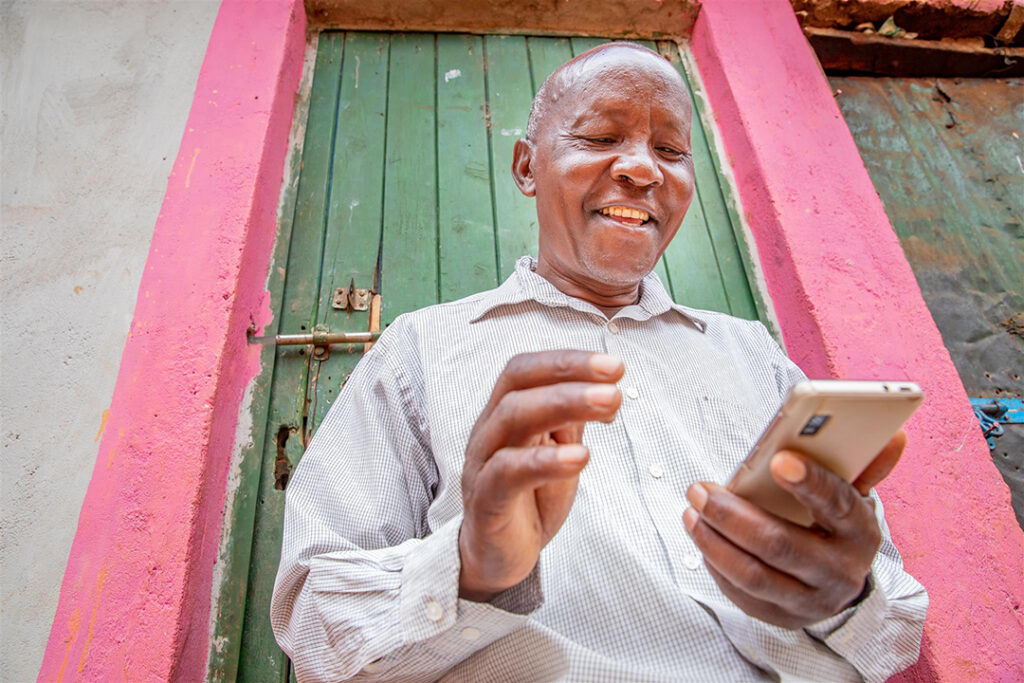ADF STAFF
Wilson Lang’at owns a 2.5-hectare farm in the village of Koiyet, which lies in Kenya’s verdant southern Rift Valley. For years, his primary source of income was trading cows while he grew maize as a smaller side business.
Now, thanks to a mobile app, he has been able to diversify his crops and improve yields, which has allowed his farm business to thrive despite economic hardships caused by the pandemic.
“Since the start of the COVID-19 pandemic, I have never stopped farming,” the 46-year-old father of six told Reuters. “Farming has become more profitable, and now it’s my full-time job.”
In the past two years, he was able to increase his maize production from 36 90-kilogram bags to 120 bags and grow beans, potatoes and tomatoes as well.
The pandemic forced Lang’at to innovate. He credits a Kenyan mobile app called DigiFarm, which lets him source seeds and fertilizer, borrow money to diversify his crops, and even plan for extreme weather such as droughts and floods.
DigiFarm, which recently expanded into Nigeria and Tanzania, offers one-stop access to lower-priced farm inputs, loans, insurance, learning content and access to markets.
It is one of many innovations sweeping through Africa’s agribusiness sector and helping to blunt the effects of the pandemic on food security and poverty.
In a September 2021 paper published in a book series called Advances in Food Security and Sustainability, two researchers studied how East African farmers were able to adapt to COVID-19.
One of the authors, Eileen Bogweh Nchanji, was surprised at how quickly farmers and buyers took to cellphones apps as a way to overcome the hurdles of supply-chain disruptions, border restrictions and lockdowns.
“They couldn’t do anything for the season, but then they realized they had more time on the farm, so they started to think about what else they could grow and how to sell more efficiently,” she said in a news release. “In Kenya, for example, someone will now go on to a WhatsApp group and say, ‘I have this quantity of beans to sell in this district,’ and then an aggregator or wholesale buyer will be able to get in contact with them directly instead of having to make stops at various farms.”
Despite COVID-19, food production in Sub-Saharan Africa did not collapse as some feared. In some places, production increased.
The South African citrus industry enjoyed a record-setting season in 2020, with exports of 146 million cartons of fruit worldwide.
But agribusiness in Africa still is dominated by exports of unprocessed products and imports of processed foods.
The continent’s young, tech-centric population, however, is embracing agritech using mobile apps, artificial intelligence and drones to help build a more diverse, resilient agricultural industry.
The number of agritech startups and the amount of funding continue to rise steadily despite the pandemic. When it comes to the amount of capital raised by startups in Africa over the past five years, the agritech sector is fifth, according to data from technology news website Disrupt Africa.
Success stories similar to that of DigiFarm include:
- HelloTractor is a Nigerian company that uses a mobile app to facilitate farm equipment sharing.
- Twiga in Kenya is a mobile e-commerce platform that harvests, buys, packages and delivers produce from member farms directly to vendors by digitizing the supply chain. It claims to cut out middlemen, eliminate food waste and reduce food prices. Twiga Foods expanded from Nairobi to five other major towns during the pandemic and recently announced expansion to Uganda.
- Maano in Zambia is a virtual farmers market that links smallholder farmers to buyers offering competitive prices for their produce while increasing farmers’ income opportunities.
The shift toward technology and e-commerce during the pandemic has the potential to transform Africa’s agricultural sector into a powerhouse that’s far more resilient in the face of future crises.
Congolese investor Kalaa Mpinga is bullish on his country’s agricultural future — enough to build up interests in palm oil factories that more directly benefit the people of Kinshasa.
“I believe in the Congo. I believe in its potential,” he told TV network Euronews. “The 20 million inhabitants are mainly fed with imported agricultural products. But we have the land, we have the climate, we have the people.”

